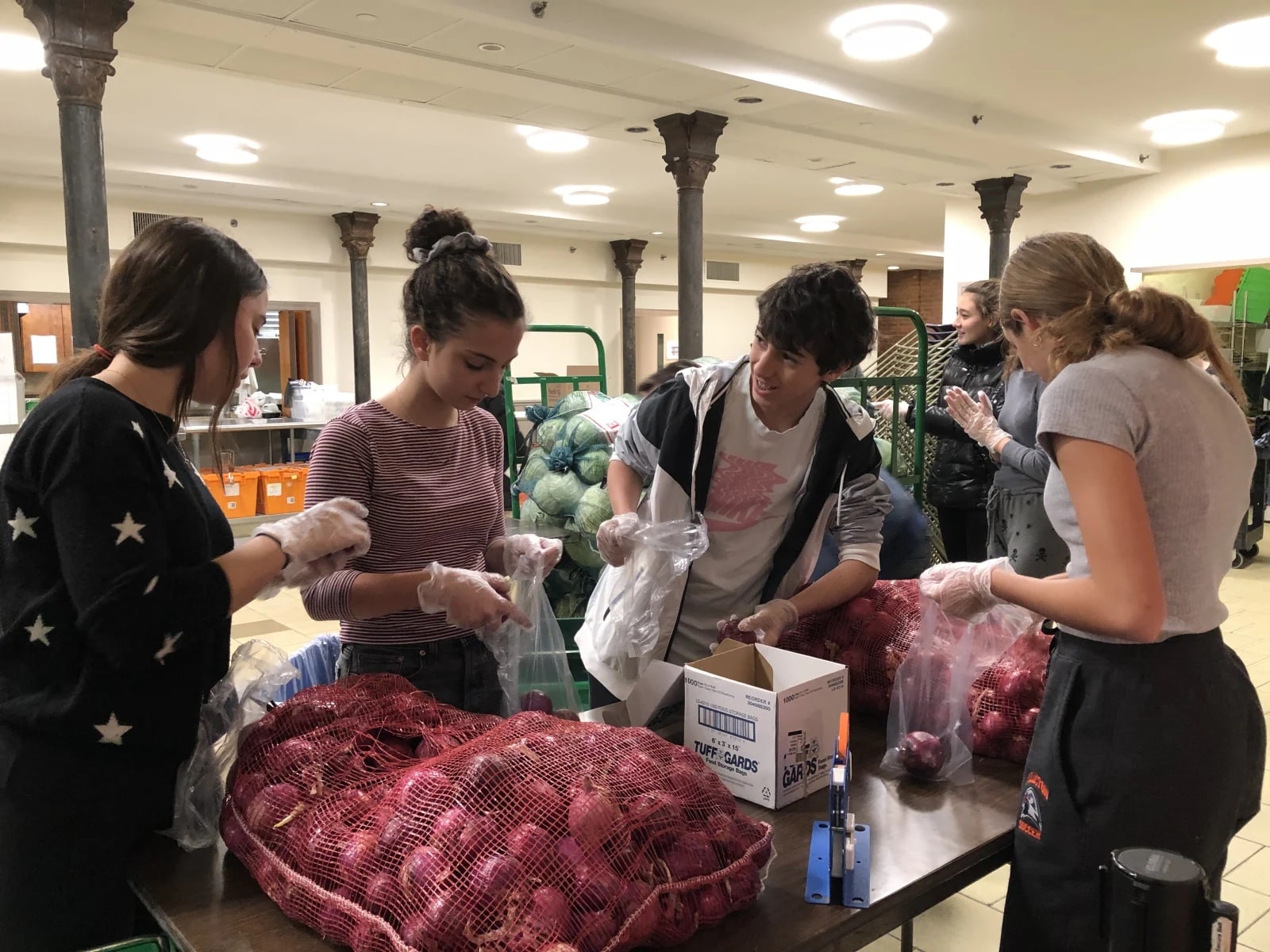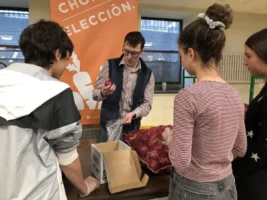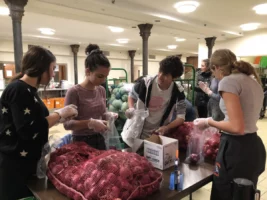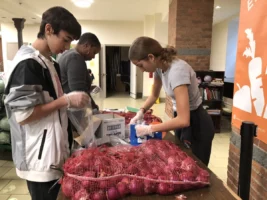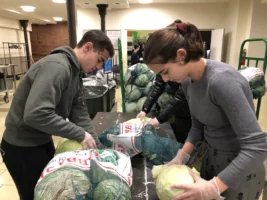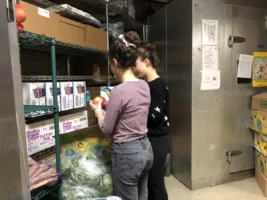Monday, November 18, is a cold, gray day on the Upper West Side of Manhattan — not yet the dead of winter, but the air no longer carries with it the warmth of late summer and early fall. Tucked away beneath the St. Paul and St. Andrew United Methodist Church, Ethical Culture Fieldston School students stand beside a towering pile of red onions, nearly as tall as the Fieldston Upper Schoolers. Another group sorts through a giant heap of white cabbages. In the next room, two students help organize recently donated jackets and sweaters. The students are working at the West Side Campaign Against Hunger (WSCAH), a food pantry located not far from the Ethical Culture campus.
“I like getting my hands — well, my gloves — dirty,” Aidan G. ’23 says while peeling back a layer of cabbage, “and knowing how my work is impacting the community rather than just donating money, since you don’t really see firsthand where it’s going.”
Each year, ECFS students from the Introduction to Community Service and Community Service Advisory Board in Training classes partner with several organizations in New York City to bring as much comfort and cheer as they can to the community.
This year, the Fieldston Upper School has launched a new partnership with the WSCAH, adding to their existing work in the city. (For example, ECFS has a longstanding partnership with the New York Common Pantry (NYCP), and, in 2019, Fieldston Upper School students received the Estée Lauder Companies Distinguished Volunteer Award at the NYCP’s annual Fill the Bag Benefit.)
The WSCAH combats food insecurity — the lack of access to enough nutritionally adequate food for all members of a household. More than 1.2 million New Yorkers are considered food insecure, and one in five children (about 330,000) living in New York City do not have access to enough nutritious food. To help alleviate food insecurity, the WSCAH works to ensure that all New Yorkers have access to a choice of healthy foods and supportive services. Based on the size of their family, visitors to the pantry are allotted a budget that will provide them and their household with three days’ worth of meals. With that budget, visitors shop the pantry as they would any other grocery store, choosing from fresh produce, meat, dairy, and dry items.
“Part of providing access with dignity is making sure people have a choice in what they’re eating,” Jake Benoit, Youth Engagement Coordinator at WSCAH, explained to ECFS students on a campus visit prior to the volunteer event. “If you just give someone a bag of food, they might not know how to cook the food in the bag. You don’t know what food they like.”
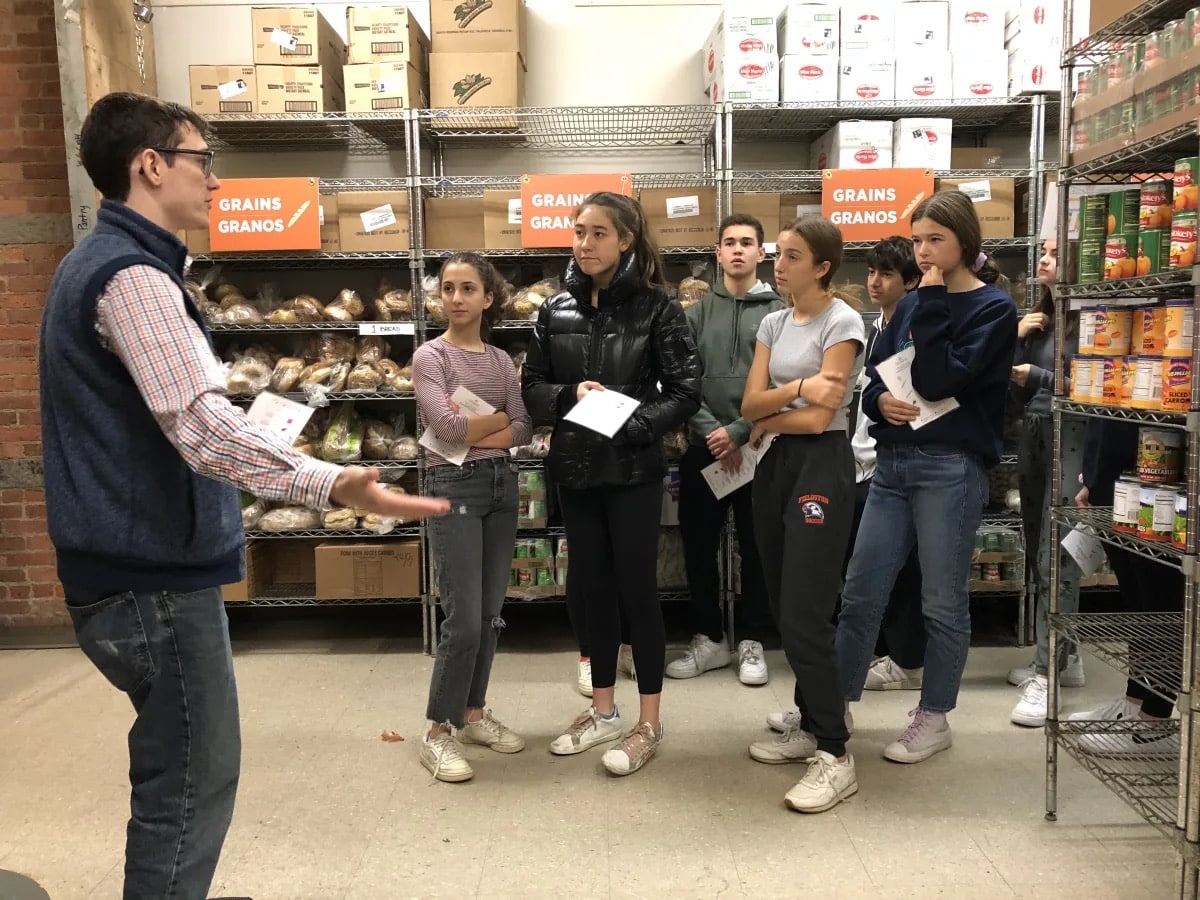
Three colorful banners hang from the walls of the pantry, outlining the three pillars of the organization: community, dignity, and choice.
At one point, a visitor of the pantry takes out his guitar and begins to sing. He fills the room with music — the Beatles’ “Can’t Buy Me Love” — as students continue to work and visitors wait their turn to peruse the shelves.
Going out into the community and volunteering is one way that ECFS students live the mission of the school. “We’re learning the same thing as other ethics classes, but we get to apply what we’re learning,” says Ella K. ’23. “Food insecurity is such a problem in New York, but your experience is so different being here than reading an article about the issue.”
“It just makes what we’ve been doing, all the research and work building up to it, feel really valuable,” adds Eve H. ’22, who helped organize the event. “We’re actually helping people.”
The students work until all the cabbages are peeled and the pile of red onions is cut in half — nearly two hours straight. There are murmurs of sore feet and backs as Benoit leads the students away from the pantry and up into the sanctuary of St. Paul and St. Andrew to debrief their experience.
Soft, blue light filters through tall stained glass windows. A constant thrum of noise fills the WSCAH, with visitors coming and going, volunteers shuffling about — but the sound is only noticeable in contrast to the silence that fills the sanctuary. There is a large banner above the altar, close to 20 feet wide, that reads “How Good It Is When Brothers and Sisters Dwell Together in Harmony.”
Benoit leads the discussion, explaining the history of the pantry, as well as its goals for the future, and how ECFS students have now played a part in the story.
“We’re still fighting poverty and hunger; 40 years hasn’t been enough time. But we’re working on it — meal by meal, cabbage by cabbage.”
To wrap up, Benoit asks the students if they have any questions — whether about food insecurity or the pantry itself. One student raises her hand. Her question? How can she sign up to come back and volunteer again.
Benoit smiles: “You’re welcome back anytime.”
